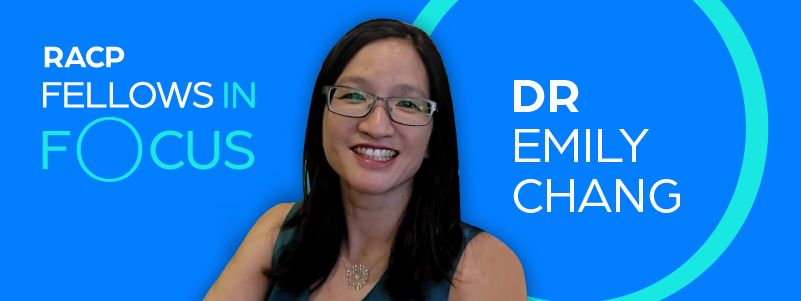RACP Fellows in Focus: Dr Emily Chang
Date published:
24 May 2021

“I've always known that I wanted to work with children and families,” reflected Dr Emily Chang on why she chose her speciality in paediatrics.
“When I got onto the wards at medical school, I started to realise that I quite like the atmosphere of the ward. It was friendly and playful. Halfway through my training, I realised I actually wanted to specialise here where I can do something that's going to be meaningful for children and families.
“I wanted to do something where it would alleviate suffering and I could work to see what their goals were and how they wanted to be cared for. To find out what's important in their lives and come up with a plan to do that.”
Emily is a paediatric palliative care specialist at the Starship Children's Hospital in Auckland, Aotearoa New Zealand. She is also co-author of the New Zealand Paediatric Palliative Care End of Life care guidelines published in 2015. This resource was made freely available on the internet and covers a range of clinical situations. Topics covered include significant news, planning care, psychosocial care, palliative care emergencies and management of pain and other distressing symptoms.
The guidelines were designed to be easily readable by general paediatric teams and provide practical 'on the ground' advice. The success of the guidelines was made apparent when adopted by palliative care units around the globe. Despite the success of the work, Emily told us, “I find pride a difficult thing to talk about. Some of the things that I find most satisfying about working with patients and families is to be able to provide some guidance and clarity to a situation of which is really clouded. For instance, there are situations where we’re not completely sure what will happen, including babies in utero who have life threatening conditions. They might survive, or they might not. It's a daunting situation and it comes up frequently.
“Do you plan for them to survive? If so, they’ll need advice on feeding care of the newborn and all the medical interventions to try and survive. On the other hand, there’s a good chance that they might die in the first ten minutes of life, so do you allow for some meaningful family time or do you need to whisk them away to surgery and they might get ten years of life? It becomes really confusing and we get situations like that, where you have to plan for both eventualities and anywhere in between.”
For Emily, “‘Communication’ for doctors is increasingly recognised as an important skill. It's not enough to be a nice person, which I discovered really early in my training.
“The skill I value the most is being able to establish a good working relationship with families who are really stressed out. There's a lot of difficult material to discuss, we need to know a lot about them and be able to introduce and communicate some of these difficult situations. If you can do that in a way that works well with the family, and you can do that quickly without having to spend of months trying to get to know them, you can make a significant difference in a particularly intense and difficult time.
Emily made it abundantly clear that a career path such as her own was certainly riddled with challenges, and emphasised how important it was, given the difficult nature of her job, to take care of yourself, “Our needs are just as important as those of all patients and families that we care for. I see this as so much more than a job. It's very much as an act of service to the people that should be cared for. I think being genuine, being yourself and having your personality, and the beauty that is your soul, shine through can be a blessing for your patients. Your humanity and compassion are what people see and engage with.”